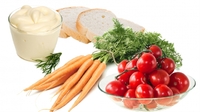Could adding vegetables make a healthier mayonnaise?

Scientists are investigating if eating mayonnaise with added vegetables, in the form of powders, could unlock health benefits.
Carotenoids are plant pigments found in many fruits and vegetables that are an important source of vitamin A and antioxidants, and known to help protect against certain cancers, cardiovascular disease and age-related vision loss.
However, our body typically absorbs less than 20% of the carotenoids available in the fruits and vegetables that contain them.
Now nutritional experts at the University of Aberdeen Rowett Institute are examining if the ingredients found in mayonnaise can increase the amount of carotenoids we ingest.
Twenty healthy volunteers are being sought to eat a purpose-made mayonnaise that contains dried carrot and tomato powder, as part of the study, which it’s hoped could lead to the development of new foods products with health benefits in the future.
Dr Viren Ranawana from the University of Aberdeen’s Rowett Insitute of Nutrition and Health said: “Carotenoids are a family of plant pigments that are found in many fruits and vegetables including tomato, carrot, broccoli, peppers, pumpkin, watermelon, oranges and peaches. They are often responsible for the colour of these foods.
“Although carotenoids are widely found in fruits and vegetables, often very little is absorbed due to their poor absorption properties. By devising ways of increasing their absorption from food we can maximize their health benefits in humans.
“Added to this, there is a notable segment of the population who do not eat adequate amounts of fruits and vegetables. This highlights the need to develop alternative ways of introducing these important compounds into the diet.”
Mayonnaise is the focus of the study because it is an emulsion made of oil and water, and scientists believe this property aids in the absorption of carotenoids.
Dr Ranawana continues: “Similar to vitamins A,D, E and K, carotenoids rely on fat for their absorption, therefore a small amount of it is necessary in the diet.
If the study shows that carotenoids added into food products - in this case mayonnaise - are absorbed well, then it would represent a novel, practical, efficient and alternative means of introducing these important nutrients into a person's day to day eating patterns. " - Dr Viren Ranawana
“There is evidence to show that fat in the form of mayonnaise may be particularly helpful in the absorption of carotenoids from vegetables, which we believe is due to its structural properties.
“Therefore, we want to see if adding vegetable powders directly into mayonnaise could be an effective way of introducing more carotenoids into people’s diets.”
It’s hoped their research could lead to the development of unique foods that contain carotenoids, and provide the associated health benefits for the consumer, in the future.
Dr Ranawana said: “If the study shows that carotenoids added into food products – in this case mayonnaise - are absorbed well, then it would represent a novel, practical, efficient and alternative means of introducing these important nutrients into a person’s day to day eating patterns. It would also pave the way for the development of new foods with added health benefits.
“The intention of this research is not to encourage the consumption of high fat foods such as mayonnaise - it is very important that the amount of fat people eat remains within the recommended daily allowance.
“But a little amount of fat is essential for the absorption of certain nutrients and by providing the most appropriate form of it in the diet in a minimal amount, we would be able to maximise absorption of these important compounds.”
Eighteen-75 year olds are being sought for the study.
Volunteers will be required to visit the Rowett Institute in Bucksburn on four separate occasions at two week intervals where they will be asked to eat the vegetable-powdered mayonnaise on bread.
Those interested in volunteering for the CAROTFoods study should contact Viren Ranawana on vranawana[at]abdn.ac.uk or Robert Kelly on rkelly[at]abdn.ac.uk or visit abdn.ac.uk/rowett/volunteer/carotfoods-study-634.php for further information.
The study is funded by a grant from the Scottish Government.

